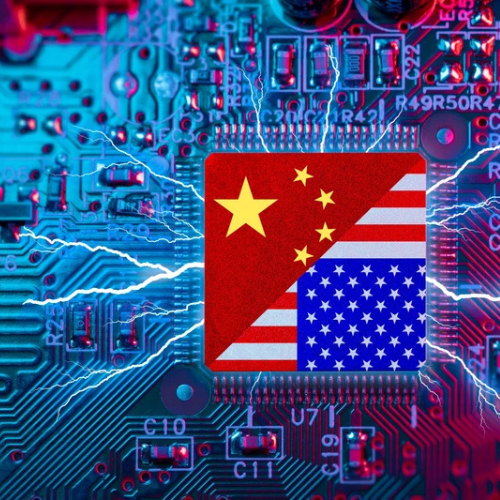As tensions rise between the United States and China over technology, Chinese tech companies are scrambling to stockpile crucial American-made microchips. This rush comes out of fear that Donald Trump’s return to power will lead to stricter sanctions on China’s tech industry. The growing demand for US chips shows just how dependent China is on American technology, especially in areas like artificial intelligence (AI) and advanced computing.
A Record-Breaking Rush for US Chips
In recent months, Chinese companies have been buying semiconductors from the US like never before. In October alone, China purchased $1.11 billion worth of American chips. That’s a massive 60% increase compared to the same month last year. Between January and October, China spent $9.61 billion on these imports, up by an impressive 42.5% year-on-year.
For five straight months, starting in June, China’s monthly chip imports from the US have exceeded $1 billion. This unprecedented spending is part of China’s efforts to prepare for potential supply cuts. The country’s tech giants know that any new restrictions could disrupt their ability to innovate, compete, and build the advanced technologies they need for the future.
These chips are essential for powering AI systems, advanced data centers, and high-performance computers. Without them, Chinese companies could fall behind in critical areas like robotics, self-driving cars, and supercomputing.
The Heart of the Problem: Why China Needs US Chips
Despite its ambitions to become self-reliant in technology, China still struggles to produce its own high-end semiconductors. Right now, the country depends heavily on American-made chips to fill that gap.
The types of chips China is buying are very specific. They include CPU-based processors, chips for storage, and signal amplifiers—key components that make AI systems and advanced computing possible. These chips are critical for industries identified as strategic priorities by Chinese President Xi Jinping.
Sophgo Firmly Denies Supplying AI Chips to Huawei Amid Investigation
One example of China’s struggles is Huawei Technologies. Due to restrictions on US chip-making technology, Huawei has to rely on older 7-nanometre technology for its latest AI processors. In comparison, global leaders like Taiwan Semiconductor Manufacturing Company (TSMC) and US firms are already working with 5-nanometre or smaller chips. This technology gap makes it hard for China to compete on a global scale.
Trump’s Track Record and China’s Growing Fears
Donald Trump’s first term as president was tough on China’s tech industry. He imposed strict restrictions on major Chinese companies, cutting off their access to US technology. Now that he’s expected to return, China fears even harsher sanctions are on the horizon.
During his earlier presidency, Trump put companies like Huawei and ZTE on a blacklist, banning them from buying key US technologies. Experts predict he’ll take similar actions this time. There’s a strong belief that Trump will try to prevent China from accessing advanced chip-making tools and machinery.
One of Trump’s goals is to encourage semiconductor production within the US. For example, he has talked about persuading global companies like TSMC to move their factories to America. This could change the global semiconductor supply chain. However, this plan has its risks. China accounts for about one-third of the world’s demand for semiconductors. If sanctions disrupt this demand, it could create challenges for US companies trying to expand chip production.
Both Trump and Joe Biden have taken steps to limit China’s access to advanced chips. Under Biden, export bans on AI chips, gaming processors, and other critical semiconductors were expanded in 2022 and 2023. These bipartisan efforts aim to slow down China’s progress in AI and other sensitive technologies.
China’s urgent effort to stockpile American chips highlights a significant weakness in its tech strategy. Even after years of trying to build its own semiconductor industry, the country still relies heavily on foreign technology. The massive chip-buying spree reveals how much is at stake in the ongoing tech war between the US and China.


